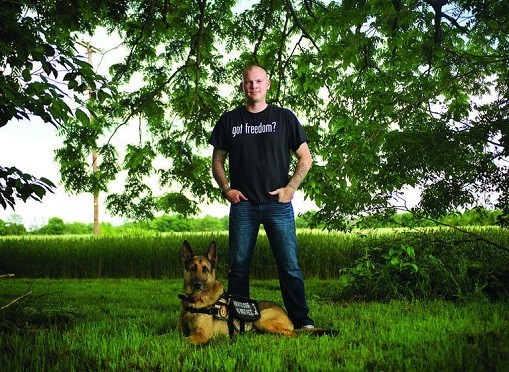Haag told his story about his descent into depression and how he didn't know if he could press on. He was severely depressed and didn't know where to turn. Paralyzed with fear, his German Shepherd Axel slowly helped him overcome his fears. Read more about his story below.
Retired Marine Capt. Jason Haag stood at the center of a small crowd inside American Legion Post 74, firmly shaking the hands of strangers.
Haag had given up the last Saturday in May—the kind of warm, sunny weekend when he might be out with his family—to speak in Charlottesville to veterans and others about the German shepherd named Axel.
If not for the dog, there might be no family at all.
“He saved my life,” Haag said. “That’s about the only way to put it.”
Three years ago, Haag could barely leave the basement of his home in Spotsylvania County
Faced with the prospect of losing his wife and three young children, who bore the brunt of his illness, he had tried just about everything to get better.
A chance meeting with a neighbor at his mailbox one day in October 2011 would at last put him on the course to recovery.
Eight months later, Haag would be on his way to Florida to get a service dog of his own.
DESCENT INTO PTSD
Haag grew up in Williamsburg, a gifted athlete who might have gone to college on a football scholarship or played minor league baseball.
He joined the Marine Corps instead. Two years later, he watched the terrorist attacks unfold on Sept. 11, 2001. By 2003, Haag, then 21, was on the front lines of the Iraqi invasion, securing oil fields before marching to Baghdad.
He descended into alcoholism, subsidized with the powerful painkillers prescribed for his injuries, he said. He deployed twice more, to Iraq and Afghanistan.
But each time he returned, his wife, Elizabeth, said in 2013, Haag was less like the person she’d known since they were in middle school, until finally he didn’t exist at all
After an ultimatum from Elizabeth in 2011, he went to his commanding officer for help.
SLOW ROAD TO RECOVERY
After that fateful meeting at the mailbox with his neighbor in 2011, he’d typed “military service dogs” into his computer search engine.
The fourth, K9s for Warriors, told him he would have a service dog of his own in eight months.
In September 2012, the retired Marine and his wife boarded a Cessna in Virginia, funded by a veteran’s organization.
He clearly remembers that first encounter with the German shepherd in Ponte Vedra Beach. Haag was not a dog person, mostly because he’d spent little time around them. Axel jumped onto Haag, pressing his paws against his new owner’s chest.
“It was not,” he said, “love at first sight.”Axel had been trained. Now it was time to train Haag. He spent the next three weeks in Florida learning various commands and how to interact with his canine.
After more than a year confined to his basement, Haag was now forced to rejoin society.
He took Axel to a restaurant and sprawling discount store, to the beach and a Home Depot. “I thought I was going to pass out,” he said. “I didn’t leave because I had Axel.”
‘WE MADE IT’
Four months later, Haag took a snowboarding trip to Colorado. He didn’t realize the significance of it until he was in a hotel room with Axel.
He looked down at the dog.
“Holy s—,” he said. “We made it.”He considered himself living proof that a service dog could help a veteran suffering from PTSD when other therapies failed. He’d made it his mission to help provide canines to others like him.
That meant fundraising and speaking events and media appearances; in the last couple of years, he and Axel have appeared in national media, including People magazine, CNN, the “Today Show” and “Fox and Friends.”
FINDING PEACE
A story, Haag decided near the end of his speech at the American Legion, would show exactly what Axel has done for him.
Not every way Axel has made life better is so dramatic. The dog’s tolerance is without limit. He doesn’t talk back. His knowing eyes seem to accept him for who he is in any moment.
A true mark of success, Haag said, is when a veteran no longer has to rely on a service dog.
He is getting there.
Somehow, when his subconscious has slipped back into those days in the desert, Axel will knowingly nuzzle him awake.
Haag will have peace once more.
Haag's story on Fredericksburg is just one inspiring story of a vet who received hope thanks to a trained service animal. Axel became his best friend and so much more.
It's incredible that a German Shepherd and other dogs can be trained to help their owner overcome life-threatening mental illnesses. It's also encouraging to know that vets can turn to a dog to help them and may even save their life!










